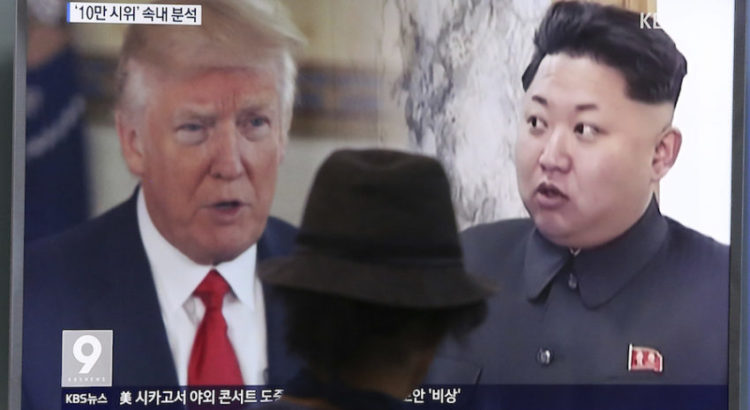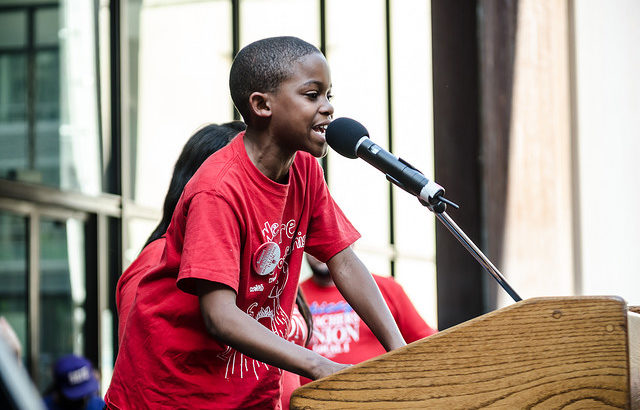By: Henry Giroux
Fighting back against the right’s politics of exclusion can be a path toward rebuilding American democracy
The health care reform bills proposed by Republicans in the House and Senate have generated heated discussions across a vast ideological and political spectrum. On the right, senators such as Rand Paul and Ted Cruz have endorsed a new level of cruelty — one that has a long history among the radical right — by arguing that the current Senate bill does not cut enough social services and provisions for the poor, children, the elderly and other vulnerable groups and needs to be even more friendly to corporate interests by providing massive tax cuts for the wealthiest Americans.
Among right-wing pundits, the message is similar. For instance, Fox News commentator Lisa Kennedy Montgomery, in a discussion about the Senate bill, stated without apparent irony that rising public concerns over the suffering, misery and death that would result from this policy bordered on “hysteria” since “we are all going to die anyway.” Montgomery’s ignorance about the relationship between access to health care and lower mortality rates is about more than ignorance. It is about a culture of cruelty that is buttressed by a moral coma.
On the other side of the ideological and political divide, liberals such as Robert Reich have rightly stated that the bill is not only cruel and inhumane, it is essentially a tax reform bill for the 1 percent and a boondoggle that benefits the vampire-like insurance companies. Others, such as Laila Lalami of The Nation, have reasoned that what we are witnessing with such policies is another example of political contempt for the poorest and most vulnerable on the part of right-wing politicians and pundits. These arguments are only partly right and do not go far enough in their criticisms of the new political dynamics and mode of authoritarianism that have overtaken the United States. Put more bluntly, they suffer from limited political horizons.
What we do know about both the proposed Republican Party federal budget and health care policies, in whatever form, is that they will lay waste to crucial elements of the social contract while causing huge amounts of suffering and misery. For instance, the Senate bill will lead to massive reductions in Medicaid spending. Medicaid covers 20 percent of all Americans or 15 million people, along with 49 percent of all births, 60 percent of all children with disabilities and 64 percent of all nursing home residents, many of whom may be left homeless without this support.
Under this bill, 22 million people will lose their health insurance coverage, to accompany massive cuts proposed to food-stamp programs that benefit at least 43 million people. The Senate health care bill allows insurance companies to charge more money from the most vulnerable. It cuts maternity care and phases out coverage for emergency services. Moreover, as Lalami points out, “this bill includes nearly $1 trillion in tax cuts, about half of which will flow to those who make more than $1 million per year.” The latter figure is significant when measured against the fact that Medicaid would see a $772 billion cut in the next 10 years.
It gets worse. The Senate bill will drastically decrease social services and health care in rural America, and one clear consequence will be rising mortality rates. In addition, Dr. Steffie Woolhandler, co-author of a recent article in the Annals of Internal Medicine, has estimated that if health insurance is taken away from 22 million people, “it raises … death rates by between 3 and 29 percent. And the math on that is that if you take health insurance away from 22 million people, about 29,000 of them will die every year, annually, as a result.”
Leftists and other progressives need a new language to understand the rise of authoritarianism in the United States and the inhumane and cruel policies it is producing. I want to argue that the discourse of single issues, whether aimed at regressive tax cuts, police violence or environmental destruction, is not enough. Nor is the traditional Marxist discourse of exploitation and accumulation by dispossession adequate for understanding the current historical conjuncture.
The problem is not merely one of exploitation but one of exclusion. This politics of exclusion, Slavoj Žižek argues, “is no longer about the old class division between workers and capitalists, but … about not allowing some people to participate in public life.” People are not simply prevented from participating in public life through tactics such as voter suppression. It is worse than that. Many groups now suffer from a crisis of agency and depoliticization because they are overburdened by the struggle to survive. Time is a disaster for them, especially in a society that suffers from what Dr. Stephen Grosz has called a “catastrophe of indifference.” The ghost of a savage capitalism haunts the health care debate and American politics in general.
What does health care, or justice itself, mean in a country dominated by corporations, the military and the ruling 1 percent? The health care crisis makes clear that the current problem of hyper-capitalism is not only about stealing resources or an intensification of the exploitation of labor, but also about a politics of exclusion and the propagation of forms of social and literal death, through what the late Zygmunt Bauman described as “the most conspicuous cases of social polarization, of deepening inequality, and of rising volumes of human poverty, misery and humiliation.”
A culture of myopia now propels single-issue analyses detached from broader issues. The current state of progressive politics has collapsed into ideological silos, and feeds “a deeper terror — of helplessness, to which uncertainty is but a contributing factor,” as Bauman puts it, which all too often is transformed into a depoliticizing cynicism or a misdirected anger fed by a Trump-like politics of rage and fear. The fear of disposability has created a new ecology of insecurity and despair that murders dreams, squelches any sense of an alternative future and depoliticizes people. Under such circumstances, the habits of oligarchy and authoritarianism become normalized.
Traditional liberal and progressive discourses about our current political quagmire are not wrong. They are simply incomplete, and they do not grasp a major shift that has taken place in the United States since the late 1970s. That shift is organized around what Bauman, Stanley Aronowitz, Saskia Sassen and Brad Evans have called a new kind of politics, one in which entire populations are considered disposable, refuse, excess and consigned to fend for themselves.
Evidence of such expulsions and social homelessness, whether referring to poor African-Americans, Mexican immigrants, Muslims or Syrian refugees, constitute a new and accelerated level of oppression under casino capitalism. Moreover, buttressed by a hyper-market-driven appeal to a radical individualism, a distrust of all social bonds, a survival-of-the-fittest ethic and a willingness to separate economic activity from social costs, neoliberal policies are now enacted in which public services are underfunded, bad schools become the norm, health care as a social provision is abandoned, child care is viewed as an individual responsibility and social assistance is viewed with disdain. Evil now appears not merely in the overt oppression of the state but as a widespread refusal on the part of many Americans to react to the suffering of others, which is all too often viewed as self-inflicted.
Under this new regime of massive cruelty and disappearance, the social state is hollowed out and the punishing state becomes the primary template or model for addressing social problems. Appeals to character as a way to explain the suffering and immiseration many people experience are now supplemented by the protocols of the security state and a culture of fear.
The ethical imagination and moral evaluation are viewed by the new authoritarians in power as objects of contempt, making it easier for the Trump administration to accelerate the dynamics and reach of the punishing state. Everyday behaviors such as jaywalking, panhandling, “walking while black” or violating a dress code in school are increasingly criminalized. Schools have become feeders into the criminal-prison-industrial complex for many young people, especially youth of color. State terrorism rains down with greater intensity on immigrants and minorities of color, religion and class. The official state message is to catch, punish and imprison excess populations — to treat them as criminals rather than lives to be saved.
The “carceral state” and a culture of fear have become the foundational elements that drive the new politics of authoritarianism and disposability. What the new health bill proposal makes clear is that the net of expulsions is widening under what could be called an accelerated politics of disposability. In the absence of a social contract and a massive shift in wealth and power to the upper 1 percent, vast elements of the population are now subject to a kind of zombie politics in which the status of the living dead is conferred upon them.
One important example is the massive indifference, if not cruelty, exhibited by the Trump administration to the opioid crisis that is ravaging more and more communities throughout the United States. The New York Times has reported that more than 59,000 Americans died of drug overdoses in 2016, the largest year-over-year increase ever recorded. The Senate health care proposal cuts funds for programs meant to address this epidemic. The end result is that more people will die and more will be forced to live as if they were the walking dead.
A politics of disposability thrives on distractions — the perpetual game show of American politics — as well as what might be called a politics of disappearance. That is, a politics enforced daily in the mainstream media, which functions as a “disimagination machine,” and renders invisible deindustrialized communities, decaying schools, neighborhoods that resemble slums in the developing world, millions of incarcerated people of color and elderly people locked in understaffed nursing homes.
We live in an age that Brad Evans and I have called an age of multiple expulsions, suggesting that once something is expelled it becomes invisible. In the current age of disposability, the systemic edges of authoritarianism have moved to the center of politics, just as politics is now an extension of state violence. Moreover, in the age of disposability, what was once considered extreme and unfortunate has now become normalized, whether we are talking about policies that actually kill people or that strip away the humanity and dignity of millions.
Disposability is not new in American history, but its more extreme predatory formations are back in new forms. Moreover, what is unique about the contemporary politics of disposability is how it has become official policy, normalized in the discourse of the market, democracy, freedom and a right-wing contempt for human life, if not the planet itself. The moral and social sanctions for greed and avarice that emerged during the Reagan presidency now proliferate unapologetically, if not with glee.
Cruelty is now hardened into a new language in which the unimaginable has become domesticated and “lives with a weight and a sense of importance unmatched in modern times,” in the words of Peter Bacon Hales. With the rise of the new authoritarianism dressed up in the language of freedom and choice, the state no longer feels obligated to provide a safety net or any measures to prevent human suffering, hardship and death.
Freedom in this limited ideological sense generally means freedom from government interference, which translates into a call for lower taxes for the rich and deregulation of the marketplace. This right-wing reduction of freedom to a limited notion of personal liberty is perfectly suited to mobilizing a notion of personal injury largely based on the fear of others. What it does not do is expand the notion of fear from the personal to the social, thus ignoring a broader notion: Freedom from want, misery and poverty. This is a damaged notion of freedom divorced from social and economic rights.
Democratically minded citizens and social movements must return to the crucial issue of addressing how class, power, exclusion, austerity, racism and inequality are part of a more comprehensive politics of disposability in America, one that makes possible what Robert Jay Lifton once called a “death-saturated age.” This suggests the need for a new political language capable of analyzing how this new dystopian politics of exclusion is buttressed by the values of a harsh form of casino capitalism that both legitimates and contributes to the suffering and hardships experienced daily by the traditional working and middle classes, and also by a wide range of groups now considered redundant — young people, poor people of color, immigrants, refugees, religious minorities, the elderly and others.
We are not simply talking about a politics that removes the protective shell of the state from daily life, but a new form of politics that creates a window on our current authoritarian dystopia. The discourse and politics of disposability offers new challenges in addressing and challenging the underlying causes of poverty, class domination, environmental destruction and a resurgent racism — not as a call for reform but as a project of radical reconstruction aimed at the creation of a new political and economic social order.
Such a politics would take seriously what it means to struggle pedagogically and politically over both ideas and material relations of power, making clear that in the current historical moment the battleground of ideas is as crucial as the battle over resources, institutions and power. What is crucial to remember is that casino capitalism or global neoliberalism has created, in Naomi Klein’s terms, “armies of locked out people whose services are no longer needed, whose lifestyles are written off as ‘backward,’ whose basic needs are unmet.”
This more expansive level of global repression and intensification of state violence negates and exposes the compromising discourse of liberalism, while reproducing new levels of systemic violence. Effective struggle against such repression would combine a democratically energized cultural politics of resistance and hope with a politics aimed at offering all workers a living wage and all citizens a guaranteed standard of living, a politics dedicated to providing decent education, housing and health care to all residents of the United States. The discourse of disposability points to another register of expulsion — one with a more progressive valence. In this case, it means refusing to equate capitalism with democracy and struggling to create a mass movement that embraces a radical democratic future.
Source:
A New American Revolution: Can We Break Out of Our Nation’s Culture of Cruelty?










 Users Today : 44
Users Today : 44 Total Users : 35459950
Total Users : 35459950 Views Today : 50
Views Today : 50 Total views : 3418515
Total views : 3418515